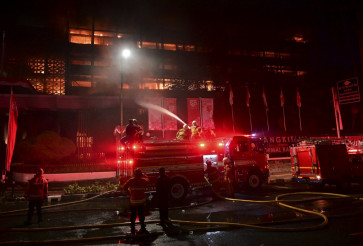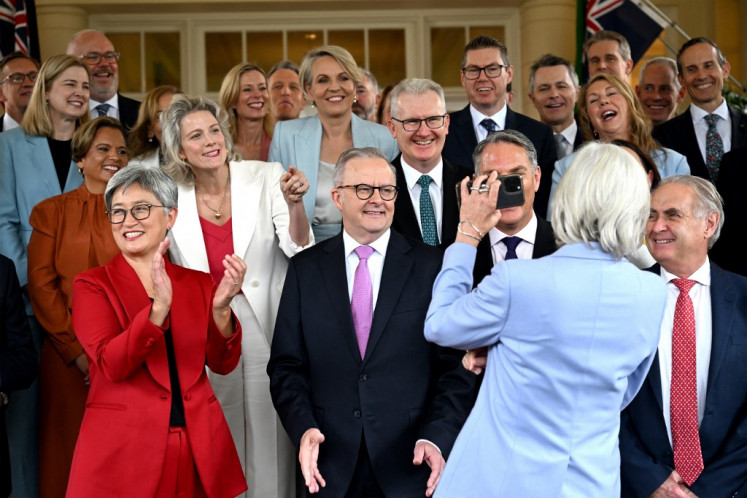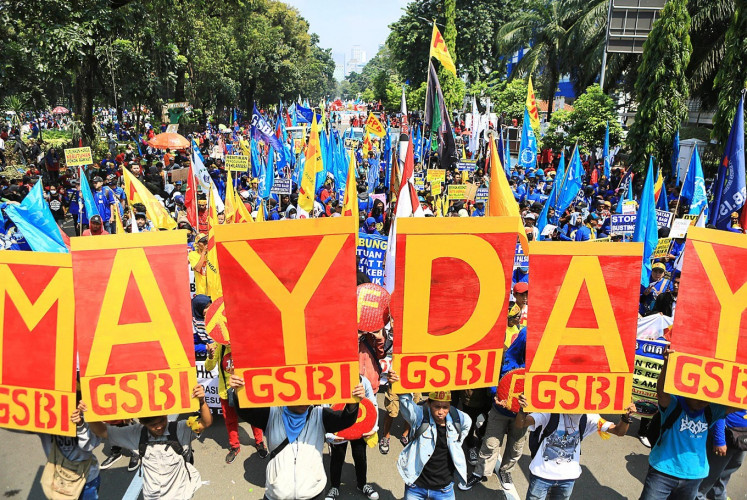Born again Muslims? ‘Hijrah’ movement picking up steam
Leap of faith: A Muslim woman with a full-faced veil plays with her daughter
Change text size
Gift Premium Articles
to Anyone

L
eap of faith: A Muslim woman with a full-faced veil plays with her daughter. Some Indonesian Muslims have rediscovered their faith and are taking part in the so-called “hijrah” (migration) movement to live a more religious life.(Courtesy of Muthia)
“I was once addicted to Korean pop [K-pop] culture. After I realized that it was pushing me away from Islam, I got rid of [my addiction],” Muslim preacher Fuadh Naim said during a recent kajian (Islamic learning forum) in South Jakarta.
Fuadh continued to share stories about his past with dozens of young Muslims, revealing that until a few years ago, he never used to pray five times a day as required by Islam, even though he had been born and raised a Muslim.
His said his addiction to K-pop also encouraged him to learn Korean and adopt the country’s culture.
But around three years ago, he started to come across Muslim preachers promoting Islamic values on social media. They encouraged him to deepen his knowledge of the religion.
He gradually began to believe that South Korean pop culture promoted lesbian, gay, bisexual and transgender (LGBT) lifestyles and casual sex, then decided that his true calling was to campaign against it.
Within a few years, the preacher gained fame particularly on social media for his relentless campaign against K-pop.
Such gradual, if not instant, transformations of a typically nominal Muslim into a more devout one have become more apparent in Indonesia in recent years, with the country seeing the increasing popularity of the so-called hijrah (migration) movement thanks to social media.
The movement is comparable to the rise of “born again Christians” in Christianity.
Hijrah in Islam refers to Prophet Muhammad’s migration from Mecca to Medina to escape persecution, which also marked the starting point of the Muslim calendar. Some Indonesian Muslims believe that the word, figuratively speaking, also means a departure from unbelief to faith.
The modern-day hijrah transformation, however, is usually most visible in the appearance, with many of those who intend to join the movement adopting a more Islamic look, such as growing a beard and wearing trousers that end above the ankles for men and wearing an abaya for women.
Sri Maliyanti, a 26-year-old housewife who said she was determined to adopt a more Muslim lifestyle, decided to wear a niqab after watching online sermons. She also decided to be a stay-at-home wife, believing that was a Muslim woman’s true nature. She stopped listening to music or uploading pictures on social media.
“My life is full of rules now, but I feel safer,” she said.
Yogyakarta-based Gadjah Mada University (UGM) sociologist Najib Azca noted that the massive spread of Islamic preaching on social media, as well as hijrah campaigns involving celebrities — such as couples Irwansyah and Zaskia Sungkar as well as Teuku Wisnu and Shireen Sungkar — had contributed to the rise of the movement.
New preachers gain popularity as social media personas with millions of people watching their sermons online, such as Abdul Somad, Adi Hidayat, Hanan Attaki and Khalid Basalamah, who attract mostly digitally savvy Muslim youths.
“Youths who are experiencing an identity crisis tend to look for role models. Most of the time, they pick celebrities or famous figures,” Najib said.
Syarif Hidayatullah Islamic State University (UIN Jakarta) researcher Irfan Abubakar argued that the majority of Muslims who joined the hijrah movement were typically those with limited religious literacy, had no strong religious background and were not affiliated with the country’s Islamic organizations like Nahdlatul Ulama (NU) and Muhammadiyah, which promote a more moderate face of Islam.
“They were probably tempted to adopt a pious lifestyle because it’s a trend,” Irfan said.
ISEAS-Yusof Ishak Institute research fellow Quinton Temby, who spent 18 months living in Bandung, West Java, to research an Islamic youth movement called Pemuda Hijrah, identified two major streams of the hijrah movement in Indonesia.
The first one is Salafism, or a puritanical stream telling followers to practice Islam the way Prophet Muhammad did. Blok-M based group Al-Ghuraba (the Strangers) in South Jakarta, who sees music as haram (prohibited), promotes Salafism.
The second stream “reconciles faith with globalized youth culture”, like the Pemuda Hijrah movement in Bandung, whose slogan is “lots of play, lots of benefits, lots of merit, a little bit of sin”, Temby said.
He added that the group recruited members from urban communities of musicians, bikers, skaters and street soccer players by offering a “community that accepts [its members] as they are, tattoos and all, and helps them to reconcile an active social life with a meaningful spiritual life”.
“A lot of it reflects mainstream middle-class piety. A lot of it is increasingly commodified and commercialized,” he said.
Last year, Indonesia’s first-ever Hijrah Fest, held at the Jakarta Convention Center, drew thousands of visitors.
One of its initiators, TV personality Arie Untung, said that around 15,000 tickets were sold in three days, each costing Rp 80,000 (US$5.67).
During the event, visitors were presented with sermons by popular preachers like Abdullah Gymnastiar, Adi Hidayat and Hanan Attaki. Many Islamic products such as fashion items, halal food and cosmetics were also on sale.
The event even included a free tattoo removal service. The second Hijrah Fest is slated to be held in Ramadan this year. Its official Instagram account, @hijrahfest, has some 422,000 followers and provides regular updates.
While scholars Najib and Irfan believe the hijrah trend would not last long and is replaceable, “we are still waiting to see where the movement will go,” Temby said.









